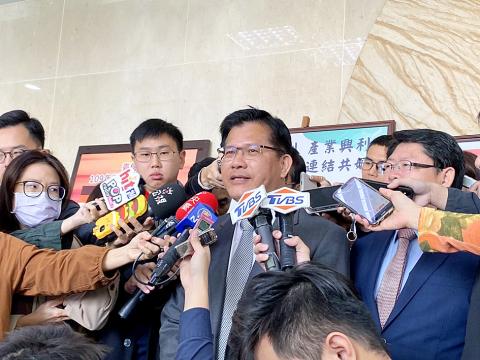The Ministry of Transportation and Communications is evaluating the Civil Aeronautics Administration’s (CAA) suggestion that it revoke Far Eastern Air Transportation’s (FAT) air operator certificate, after the airline on Dec. 13 abruptly announced that it would cease operations, Minister of Transportation and Communications Lin Chia-lung (林佳龍) said yesterday.
“We have received a recommendation from the CAA, which says that FAT’s air operator certificate should be revoked per the Civil Aviation Act (民用航空法). The ministry’s Department of Aviation and Navigation, and Legal Department have asked the civil aviation authority to offer a more complete report as grounds for certificate revocation,” Lin said.
While the airline has said that it has found investors to fund its operations and is seeking to resume flight services, the CAA has yet to allow the airline to do so.

Photo: Hsiao Yu-hsin, Taipei Times
FAT on Monday announced that it would have to delay paying employees’ salaries after Taiwan Cooperative Bank seized its operational funds, adding that a Hong Kong firm is interested in investing in the airline.
However, financial problems are only part of the airline’s troubles, Lin said.
FAT has contravened the act by ceasing operations without any advance notice, which could cost the airline its air operator certificate, he said.
Although the airline has spoken many times about potential investors, Lin said this should be treated as a separate matter.
“FAT should honestly face its financial situation, as it has trouble even paying its employees. Its top priority should be to take care of its employees,” Lin said.
The ministry is not experiencing any pressure to settle the matter quickly, he added.
Aviation safety is the ministry’s guiding principle in deciding whether the airline should be permitted to resume flight services, he said.
“The airline has claimed that [some of] its employees had misjudged the situation and erroneously made the announcement to cease operations. Its response confirmed the CAA’s worst fears. Before we can revoke [FAT’s] license, we not only have to consider that it has contravened the law, but also need to ensure that we strictly follow legal procedures in revoking its certificate, in case it challenges us in court,” he said.
Deputy Minister of Transportation and Communications Wang Kwo-tsai (王國材) said that even if the ministry does not revoke FAT’s license, the airline would have to complete several procedures before it can resume flight services.
Revoking FAT’s air operator certificate is a serious matter, and the ministry wants to ensure that it is backed by solid legal arguments if it decides to do so, Wang said, adding that the CAA has been asked to ascertain the rules of the act that the airline might have contravened.
Although the airline offered flights to Japan, South Korea and China, a majority of its flights were domestic, particularly to the outlying Kinmen and Penghu counties, Wang said, adding that the airline controls about one-third of the market share.
The ministry has plans to transport people to the outlying islands for Saturday’s elections and for the Lunar New Year holiday in case it revokes FAT’s certificate, Wang said.
The two other domestic carriers — Uni Air and Mandarin Airlines — can offer additional flights or use larger aircraft to transport the additional passengers, he said.

Taiwan would welcome the return of Honduras as a diplomatic ally if its next president decides to make such a move, Minister of Foreign Affairs Lin Chia-lung (林佳龍) said yesterday. “Of course, we would welcome Honduras if they want to restore diplomatic ties with Taiwan after their elections,” Lin said at a meeting of the legislature’s Foreign Affairs and National Defense Committee, when asked to comment on statements made by two of the three Honduran presidential candidates during the presidential campaign in the Central American country. Taiwan is paying close attention to the region as a whole in the wake of a

President William Lai (賴清德) has appointed former vice president Chen Chien-jen (陳建仁) to attend the late Pope Francis’ funeral at the Vatican City on Saturday on his behalf, the Ministry of Foreign Affairs said today. The Holy See announced Francis’ funeral would take place on Saturday at 10am in St Peter’s Square. The ministry expressed condolences over Francis’ passing and said that Chen would represent Taiwan at the funeral and offer condolences in person. Taiwan and the Vatican have a long-standing and close diplomatic relationship, the ministry said. Both sides agreed to have Chen represent Taiwan at the funeral, given his Catholic identity and

Lawmakers from the Democratic Progressive Party (DPP) yesterday established a friendship group with their counterparts in Ukraine to promote parliamentary exchanges between the two countries. A ceremony in Taipei for the Taiwan-Ukraine Parliamentary Friendship Association, initiated by DPP Legislator Chen Kuan-ting (陳冠廷), was attended by lawmakers and officials, including Deputy Minister of Foreign Affairs Francois Wu (吳志中) and European Economic and Trade Office in Taiwan Director Lutz Gullner. The increasingly dire situation in Ukraine is a global concern, and Taiwan cannot turn its back when the latter is in need of help, as the two countries share many common values and interests,

Chinese Nationalist Party (KMT) Chairman Eric Chu (朱立倫), spokeswoman Yang Chih-yu (楊智伃) and Legislator Hsieh Lung-chieh (謝龍介) would be summoned by police for questioning for leading an illegal assembly on Thursday evening last week, Minister of the Interior Liu Shyh-fang (劉世芳) said today. The three KMT officials led an assembly outside the Taipei City Prosecutors’ Office, a restricted area where public assembly is not allowed, protesting the questioning of several KMT staff and searches of KMT headquarters and offices in a recall petition forgery case. Chu, Yang and Hsieh are all suspected of contravening the Assembly and Parade Act (集會遊行法) by holding